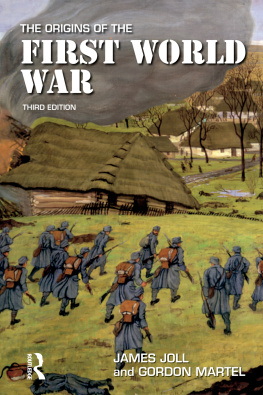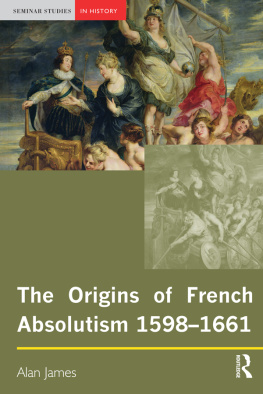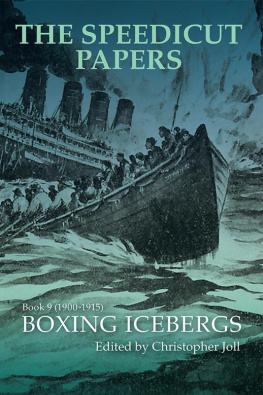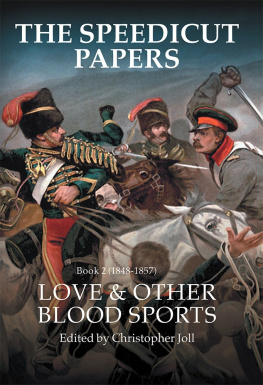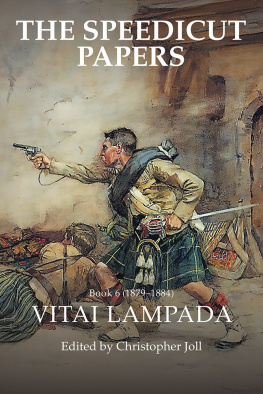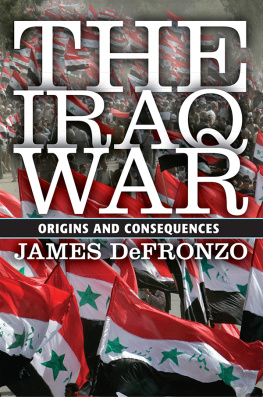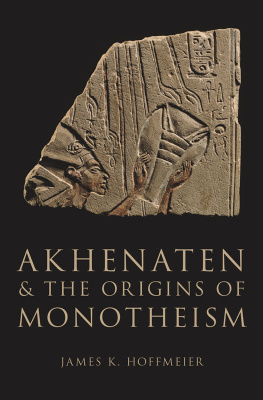Joll James - The Origins of the First World War
Here you can read online Joll James - The Origins of the First World War full text of the book (entire story) in english for free. Download pdf and epub, get meaning, cover and reviews about this ebook. City: London, year: 2014, publisher: Taylor & Francis Ltd;Routledge, genre: History. Description of the work, (preface) as well as reviews are available. Best literature library LitArk.com created for fans of good reading and offers a wide selection of genres:
Romance novel
Science fiction
Adventure
Detective
Science
History
Home and family
Prose
Art
Politics
Computer
Non-fiction
Religion
Business
Children
Humor
Choose a favorite category and find really read worthwhile books. Enjoy immersion in the world of imagination, feel the emotions of the characters or learn something new for yourself, make an fascinating discovery.
- Book:The Origins of the First World War
- Author:
- Publisher:Taylor & Francis Ltd;Routledge
- Genre:
- Year:2014
- City:London
- Rating:3 / 5
- Favourites:Add to favourites
- Your mark:
- 60
- 1
- 2
- 3
- 4
- 5
The Origins of the First World War: summary, description and annotation
We offer to read an annotation, description, summary or preface (depends on what the author of the book "The Origins of the First World War" wrote himself). If you haven't found the necessary information about the book — write in the comments, we will try to find it.
The Origins of the First World War — read online for free the complete book (whole text) full work
Below is the text of the book, divided by pages. System saving the place of the last page read, allows you to conveniently read the book "The Origins of the First World War" online for free, without having to search again every time where you left off. Put a bookmark, and you can go to the page where you finished reading at any time.
Font size:
Interval:
Bookmark:

The Origins of the First World War
General Editor: Harry Hearder
Titles already published:
THE ORIGINS OF THE FRENCH REVOLUTIONARY WARS
T.C.W. Blanning
THE ORIGINS OF THE CRIMEAN WAR
David M. Goldfrank
THE ORIGINS OF THE ITALIAN WARS OF INDEPENDENCE
Frank J. Coppa
THE ORIGINS OF THE AMERICAN CIVIL WAR
Brian Holden Reid
THE ORIGINS OF THE WARS OF GERMAN UNIFICATION
William Carr
THE ORIGINS OF THE SOUTH AFRICAN WAR, 18991902
Iain R. Smith
THE ORIGINS OF THE RUSSOJAPANESE WAR
Ian Nish
THE ORIGINS OF THE FIRST WORLD WAR (Third Edition)
James Joll and Gordon Martel
THE ORIGINS OF THE RUSSIAN CIVIL WAR
Geoffrey Swain
THE ORIGINS OF THE SECOND WORLD WAR IN EUROPE (Second Edition)
P.M.H. Bell
THE ORIGINS OF THE SECOND WORLD WAR IN ASIA AND THE PACIFIC
Akira Iriye
THE ORIGINS OF THE GREEK CIVIL WAR
David H. Close
THE ORIGINS OF THE KOREAN WAR (Second Edition)
Peter Lowe
THE ORIGINS OF THE VIETNAM WAR
Anthony Short
THE ORIGINS OF THE ARABISRAELI WAR (Fourth Edition)
Ritchie Ovendale
THE ORIGINS OF THE PRESENT TROUBLES IN NORTHERN IRELAND
Caroline Kennedy-Pipe
THIRD EDITION
James Joll and Gordon Martel

First published 1984 by Pearson Education Limited
Third edition 2007
Published 2013 by Routledge
2 Park Square, Milton Park, Abingdon, Oxon OX14 4RN
711 Third Avenue, New York, NY 10017, USA
Routledge is an imprint of the Taylor & Francis Group, an informa business
The Estate of Professor James Joll and Gordon Martel 2007
The right of James Joll and Gordon Martel to be identified as authors of this work has been asserted by them in accordance with the Copyright, Designs and Patents Act 1988.
All rights reserved. No part of this book may be reprinted or reproduced or utilised in any form or by any electronic, mechanical, or other means, now known or hereafter invented, including photocopying and recording, or in any information storage or retrieval system, without permission in writing from the publishers.
Notices
Knowledge and best practice in this field are constantly changing. As new research and experience broaden our understanding, changes in research methods, professional practices, or medical treatment may become necessary.
Practitioners and researchers must always rely on their own experience and knowledge in evaluating and using any information, methods, compounds, or experiments described herein. In using such information or methods they should be mindful of their own safety and the safety of others, including parties for whom they have a professional responsibility.
To the fullest extent of the law, neither the Publisher nor the authors, contributors, or editors, assume any liability for any injury and/or damage to persons or property as a matter of products liability, negligence or otherwise, or from any use or operation of any methods, products, instructions, or ideas contained in the material herein.
ISBN-13: 978-0-582-42379-4 (pbk)
British Library Cataloguing in Publication Data
A CIP catalogue record for this book can be obtained from the British Library
Library of Congress Catalogibg in Publication Data
A CIP catalog record for this book can be obtained from the Library of Congress
Set by 35 in 10/13.5pt Sabon
Iam delighted to have been presented with the opportunity to keep James Jolls book alive in spite of his death in 1994 by bringing it up to date. His approach to the subject was distinguished both by his mastery of the ethos of Europe in the decades before the war and by his decision to construct the book as a series of essays on the principal interpretations of the war. His famous lecture (then essay) on the Unspoken Assumptions in the minds of those who took Europe to war is, I believe, primarily responsible for much of the scholarship on this subject over the past thirty years, while his participation in the Fischer Debate was instrumental in appreciating the value (and some of the shortcomings) of Fritz Fischers approach. Thus, his knowledge, erudition and historical instincts resulted in the outstanding synthesis that has made this book a classic.
Most of the text of the first edition was composed between 1980 and 1983; the second edition was not so much a revision as an addition of materials concerning Italy. Thus, even the most recent (1992) edition contains few references to the scholarship of the past 25 years. Certainly those years have witnessed nothing like the controversies of the previous 25, in which James Joll was so deeply engaged. There has been nothing like the debate inspired by Fritz Fischer; rather, the work of historians has extended both the range and depth of our understanding of the themes highlighted in this book. We have had numerous new biographies of many of the leading characters involved: three of Kaiser Wilhelm II (the most outstanding of which, that by John Rhl, has taken us only to 1900 in two volumes) and three of Tsar Nicholas II (including Dominic Lievens brilliant study); numerous biographies of leading politicians, ranging from John Keigers excellent study of Raymond Poincar to Katharine Lermans on Bernhard von Blows career in office; and even more numerous biographies of the diplomats and officials responsible for the conduct of foreign policy in the years before 1914. We have new studies of nationalism and schooling, trade and finance, imperialism and colonialism, strategy and strategists, socialism and pacifism, militarism and navalism, racism and youth movements. Some of these studies offer new syntheses of their particular subjects; others are based on new and detailed archival research; all of them pertain to some degree to the themes addressed in this book.
In addition to the work of Rhl, Lieven and Keiger, three works of quite different nature and scope stand out: Samuel Williamsons Austria-Hungary and the Origins of the First World War (1991), David Stevensons Armaments and the Coming of War (1996), and Keith Neilsons Britain and the Last Tsar (1995). Each of these authors have made exceptionally valuable contributions to our understanding of the causes of war and each of them has, I believe, corroborated many of the conclusions argued by James Joll in this book. This is not to overlook the value of distinguished monographs such as Annika Mombauers Helmuth von Moltke and the Origins of the First World War , or M.B. Haynes The French Foreign Office and the Origins of the First World War , or D.M. McDonalds United Government and Foreign Policy in Russia 19001914 , or Keith Hamiltons Bertie of Thame: Edwardian Ambassador , or Bruce Mennings Bayonets before Bullets: The Imperial Russian Army, 18611914 , to cite only a few examples. The list, although not endless, is certainly extensive. There have been, moreover, literally dozens of important articles in a wide variety of historical journals that bear upon important aspects of the wars origins.
Early on in this work I made a strategic decision of my own: that I would not simply add a chapter of whats happened since 1991 (or 1984) and update the bibliography. The range of themes covered in the book would have made such an approach awkward and, I think, not particularly useful. Instead, I chose to attempt to integrate and refer to this work throughout the existing text. Thus, I have striven to maintain the original style and tone, revising interpretations slightly when this seemed warranted, but usually adding new details, examples or references that extended the points that James Joll had made. In this task I have received the helpful advice of many colleagues, among whom I should particularly like to acknowledge my gratitude to John Keiger, Annika Mombauer, David Stevenson and Samuel Williamson. I believe it speaks volumes for the knowledge and insight of James Joll that no significant change in interpretation has seemed necessary. If readers of this new version have difficulty discerning where the prose of James Joll ends and where mine begins I shall have succeeded in my strategy. If this new version keeps alive this remarkable book for another generation of readers I shall have succeeded in my aim. For my part, I viewed this task as an act of respect: to honour the work of one of the twentieth centurys outstanding historians.
Font size:
Interval:
Bookmark:
Similar books «The Origins of the First World War»
Look at similar books to The Origins of the First World War. We have selected literature similar in name and meaning in the hope of providing readers with more options to find new, interesting, not yet read works.
Discussion, reviews of the book The Origins of the First World War and just readers' own opinions. Leave your comments, write what you think about the work, its meaning or the main characters. Specify what exactly you liked and what you didn't like, and why you think so.

